French terror attacks: Victim obituaries
- Published
As the manhunt for the attackers continues, here's a tribute to those killed - in 60 seconds
Twelve people died when a bloody attack was launched on the office of France's satirical magazine Charlie Hebdo. The following day a policewoman was murdered by Amedy Coulibaly, who held up a Jewish supermarket the next day, killing four people. Here are brief profiles of all 17 victims.

Stephane Charbonnier, editor
Fergal Keane speaks to the widow of Stephane Charbonnier, editor of Charlie Hebdo
"Charb" was 47. He had received death threats in the past and had been under police protection.
A stout defender of the left-wing magazine's provocative approach, he refused to bow to critics.
"I don't have kids, no wife, no car, no debt," he once told France's Le Monde newspaper. "Maybe it's a little pompous to say, but I'd rather die standing than live on my knees."
Mr Charbonnier's partner, Jeannette Bougrab, told the BBC she rushed to the magazines offices after Wednesday's attack to find out if he was dead.
A former government minister, Ms Bougrab told the BBC's Fergal Keane they had discussed the possibility he might be targeted.
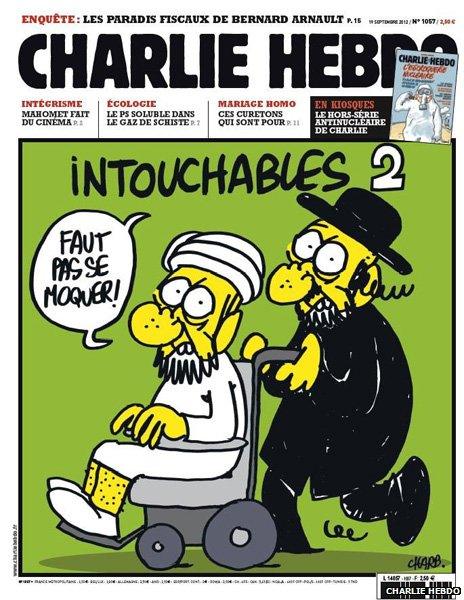
19 Sep 2012 issue: An Orthodox Jew pushes an old Muslim in a wheelchair, both shouting “You mustn’t make fun!”
After Charlie Hebdo's office was fire-bombed in 2011 in response to cartoons featuring the Prophet Muhammad, Mr Charbonnier said in a BBC interview that the attack had targeted freedom itself but he blamed "idiot extremists" who, he said, did not represent France's Muslim population.
Charlie Hebdo was right, he said, to defy Islamists and "make their lives difficult, as much as they do ours".

Jean Cabut, cartoonist
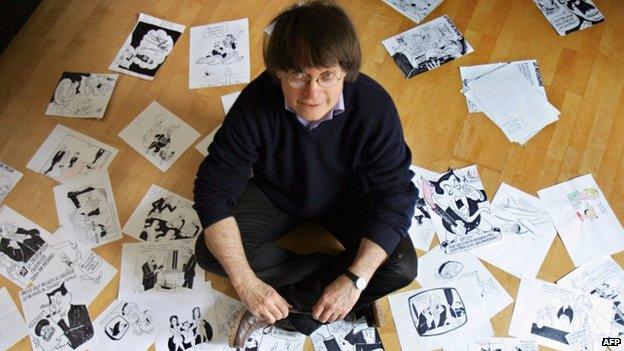
At 76, "Cabu" was one of France's most popular cartoonists over a career spanning six decades.
Born in Chalons-sur-Marne, he studied at the Ecole Estienne in Paris and had his sketches first published in the 1950s.
Serving in the French military during the Algerian war of independence, he drew cartoons for the army magazine Bled and other publications.
In 1960, he co-founded Hara-Kiri magazine, a forerunner of Charlie Hebdo.
His popular characters included the Grand Duduche, a skinny, blond schoolboy bearing some resemblance to the cartoonist himself, and Mon Beauf, a caricature of the French everyman.
In his words: "Sometimes laughter can hurt but laughter, humour and mockery are our only weapons."

Georges Wolinski, cartoonist
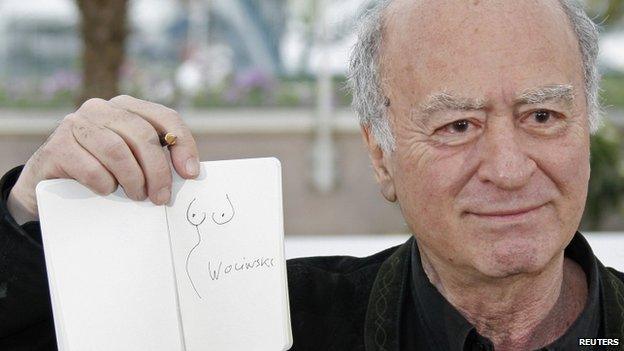
The 80-year-old was known as "Wolin" to his friends, Le Monde writes (in French), external.
He was born in Tunisia to Jewish parents. His father was murdered in 1936, and Georges - though only a toddler at the time - was later quoted as saying, "The ghost of my father has haunted me all my life."
He moved to France in the 1940s to study architecture but later became obsessed with drawing cartoons.
In the 1960s he started contributing works - often on political and erotic themes - to Hara-Kiri and other publications.
In 2005, he was awarded France's highest decoration, the Legion of Honour.
After news of her father's murder, Wolinski's daughter Elsa wrote on social media, external, "Daddy's gone. Not Wolinski", posting a photo of his empty desk.
He was a famous dandy and bon vivant, according to Le Parisien (in French), external.
Mistrusting all religions, he once said, "paradise is full of idiots who believe it exists".

Bernard Verlhac, cartoonist
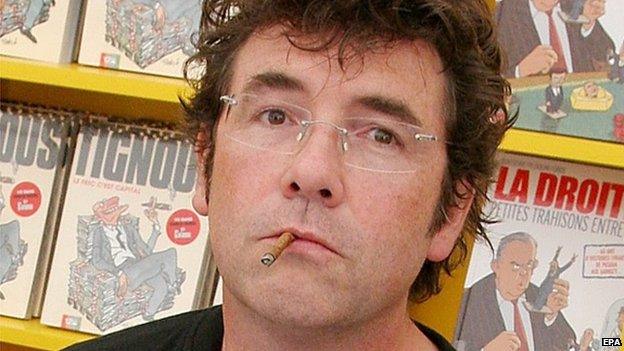
Tignous reportedly sent his last drawing the night before he was killed
"Tignous", 57, also contributed to the Marianne and Fluide Glacial magazines.
A member of a group of artists called Cartoonists for Peace, his work was famous for its savage attacks on hypocrisy.
One memorable cartoon, according to Le Monde, featured a wealthy man asking, "At a time when we all risk dying of bird flu, you obsess over my exorbitant salary?"
On the night before his death, he sent his last drawing, an apparent caricature of French President Francois Hollande with New Year wishes, external, to Presse Judiciaire, an association of French reporters covering court cases.

Philippe Honore, cartoonist
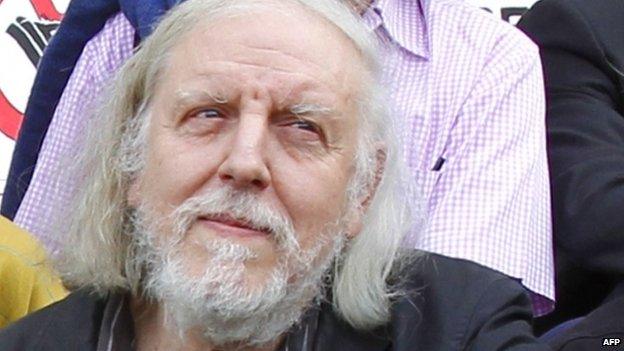
Honore, as the 73-year-old was known, was a regular contributor to Charlie Hebdo, campaigning against injustice and cynicism.
His cartoons also appeared in several other publications in France.
The gentleness and kindness of the "bearded giant" were legendary among his colleagues, according to France's Paris Match (in French), external.

Bernard Maris, economist
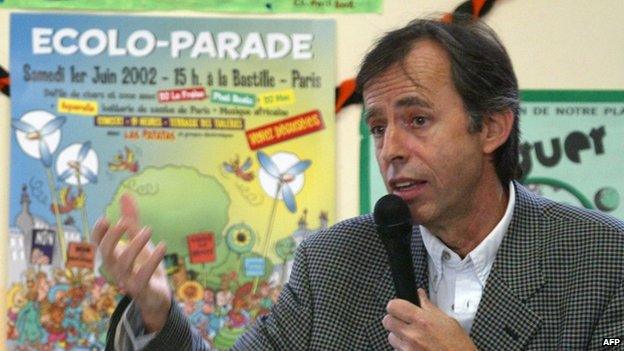
The 68-year-old had a weekly column in Charlie Hebdo called Uncle Bernard.
He regularly commented on economic issues for the France Inter radio network and taught economics at a branch of the University of Paris.
Maris was also a member of the General Council of the Bank of France.
"Bernard Maris was a man of heart, of culture and of great tolerance,'' said Christian Noyer, the bank's president "We will miss him very much."
But he was equally a man of the left, a devotee of Marx and Keynes who railed at the euro and consumer society, Le Monde writes. He felt passionately about the "death of the Left" in France.

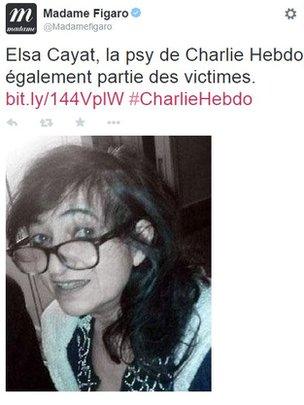
Elsa Cayat, psychoanalyst and columnist
The only woman among the 12 victims, the 54-year-old wrote the magazine's Charlie Divan (English: Charlie's couch) column.
Her column wandered from subjects such as parental authority to the roots of the Holocaust, Madame Figaro writes (in French), external.
A trained psychiatrist, she had a vast number of patients, attracting intellectuals with her listening skills and analytical powers, according to her aunt, Jacqueline Raul-Duval.
One of her long-time patients, who gave her name only as Valerie, wrote an affectionate tribute on Facebook in which she says, "I think of her husband, her adolescent daughter, her big padding dog, her patients whom she is leaving without their mirror, her family, her friends."
Her cousin, Sophie Bramly, said she feared she had been killed for being Jewish.

Mustapha Ourrad, copy editor
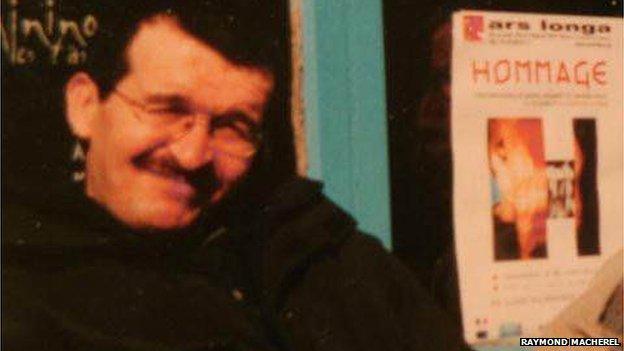
Born in Algeria, he always identified with that country's Kabylia region, Le Monde writes. Arriving in France at the age of 20, he long worked for Viva magazine.
A self-taught man, he nonetheless impressed colleagues with his learning and knowledge of philosophy, particularly Nietzsche.
Friends said they were devastated by the loss of a "well-loved man".

Michel Renaud, visitor
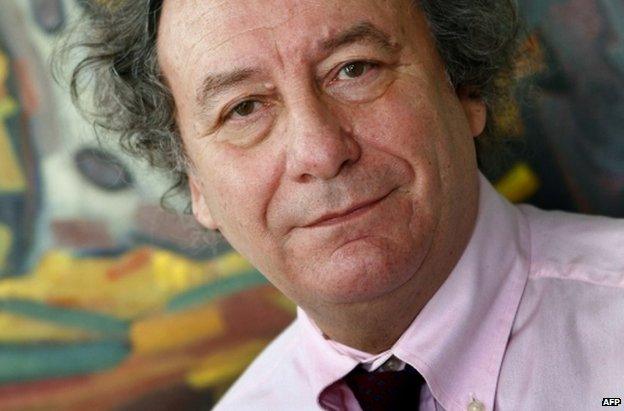
Associated closely with the biennial Carnet de Voyage festival in his home city, Clermont-Ferrand, Mr Renaud was visiting the office with a colleague who survived the shooting.
Those he worked with at the festival are "in mourning", according to a statement on its website, external.
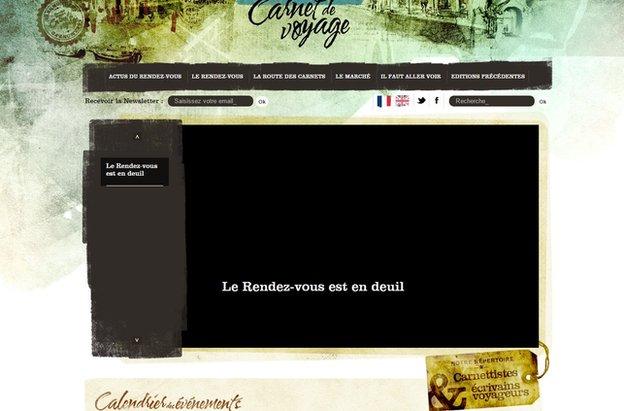

Frederic Boisseau, caretaker
The 42-year-old was in the reception area when the gunmen entered the building, Le Monde writes.
Married, he was the father of two children.
His employer, Sodexo, said in a statement that "such a terrible loss of life" was "unconscionable".

Police victims
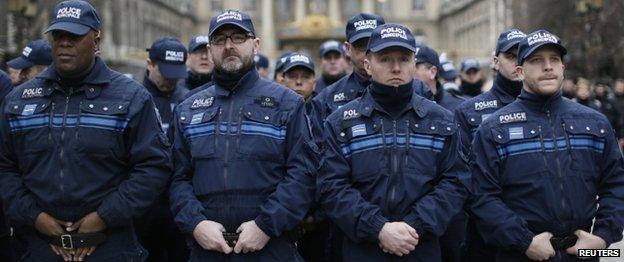
French municipal police attend a national tribute to the three dead officers in Paris
Three police lost their lives in the course of the attacks and were later honoured at a ceremony by President Francois Hollande. Two were murdered during and after the onslaught on Charlie Hebdo. Another was shot by Amedy Coulibaly the following day at Montrouge.

Ahmed Merabet, policeman
Arriving at the scene of the attack, the 42-year-old opened fire on the gunmen but was injured in the exchange, Le Figaro writes.
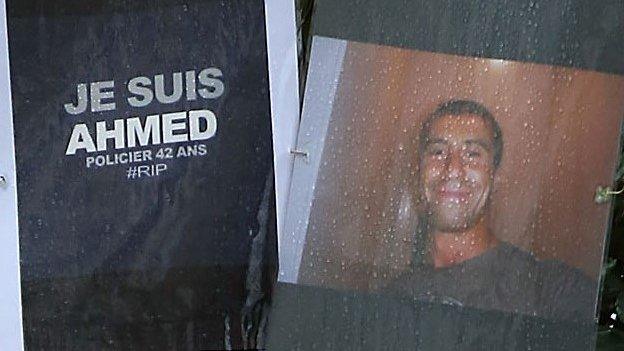
Ahmed Merabet had just been promoted to the Judicial Police
Then, as he lay on the ground, a gunman shot him in the head from close range, in an act captured on amateur video.
He was a Muslim - a fact picked up by bloggers seeking to defend the community against "terrorist" slurs.
The hash tag #JeSuisAhmed (I am Ahmed) is being circulated on social media in his memory. "In your memory we won't allow people hurt and insult your Muslim community because of this terrorist act. You're a hero," wrote one tweeter.
He had just been promoted to the Judicial Police. Police union rep Rocco Contento described Mr Merabet as "someone very discreet and conscientious".
According to his brother Malek, Mr Merabet was "Muslim, and very proud of being a police officer and defending the values of the Republic".
He had worked hard to look after his mother and family over the last 20 years, his brother added.

Brigadier Franck Brinsolaro, police bodyguard
The 49-year-old was assigned to protect Charb after he received death threats. He was married, with two children.
He had no chance to act before he was shot by the attackers, a police colleague was quoted as saying by Le Figaro.
His brother, fellow policeman Philippe Brinsolaro, paid tribute: "We mustn't forget that what happened yesterday, whatever may happen next - a police officer, whenever it's needed, will put him or herself in harm's way when the security of the country is at stake. And today I want to pay tribute to all of my colleagues, to all those who get up every day to do a difficult job."

Clarissa Jean-Philippe, policewoman
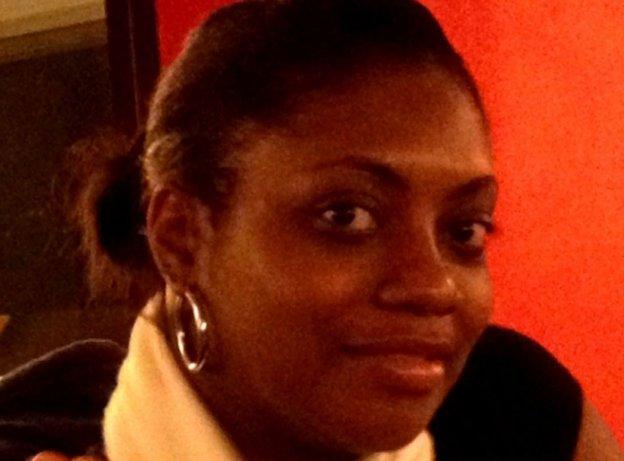
Aged 26, she was about to graduate as a municipal policewoman and was fatally shot in the back on 8 January while responding to a traffic accident a short distance from a Jewish school in Montrouge, Paris.
Described by colleagues as "lively and dynamic", she was from the French Caribbean island of Martinique, where her family still lives.
She was directing traffic after the accident when she was shot, and parents at the nearby school believe her actions prevented a far greater attack on its children.

Kosher supermarket victims
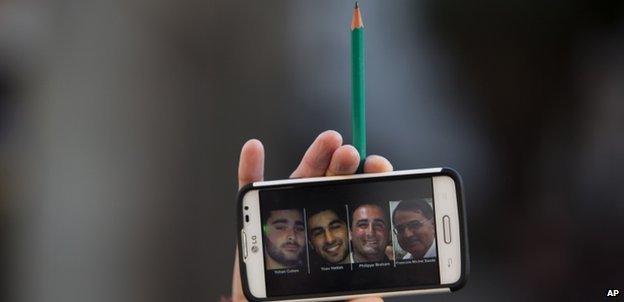
Four men died when Amedy Coulibaly held up a kosher supermarket on 9 January, seizing hostages. All were shot dead by Coulibaly. Their bodies were taken to Jerusalem for burial on the Mount of Olives.

Yoav Hattab
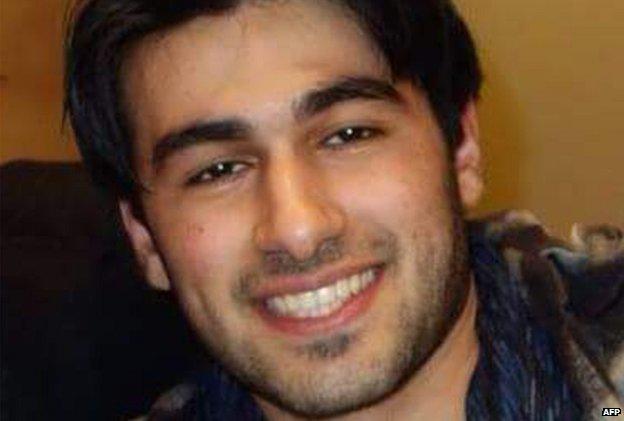
A 21-year-old student in Paris, he was the son of the chief rabbi of Tunis and lost his aunt in a 1985 gun attack on a synagogue on the Tunisian island of Djerba.
Yoav Hattab had just returned from a trip to Israel and was buying bread for his family's Sabbath meal when Coulibaly stormed into the supermarket.
He was one of seven brothers and had many friends in Tunisia, who saw him as someone seeking unity between the country's Muslims and Jews. An Israeli friend told Le Figaro that Yoav had spoken of feeling safer in Tunisia than Paris. "From the moment he arrived in France, he was worried for the safety of his community," he said.

Yohan Cohen
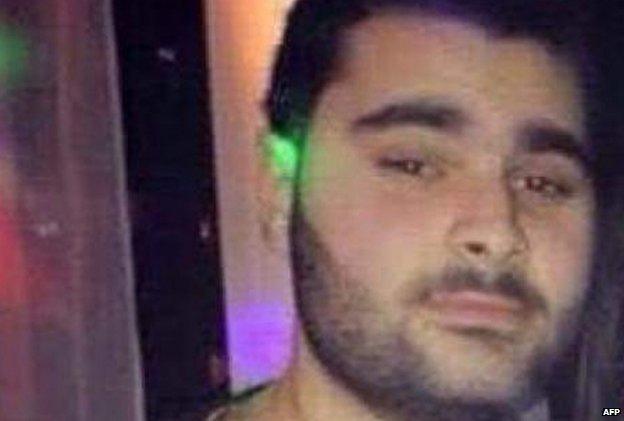
Aged 20, he had been working at the Hyper Cacher supermarket for a year while studying economics.
He had been living with his mother, originally from Tunisia, in nearby Sarcelles before the attack.
Witnesses say both Yohan Cohen and Yoav Hattab were shot after seizing a Kalashnikov belonging to Amedy Coulibaly, but the gun was empty.

Philippe Braham
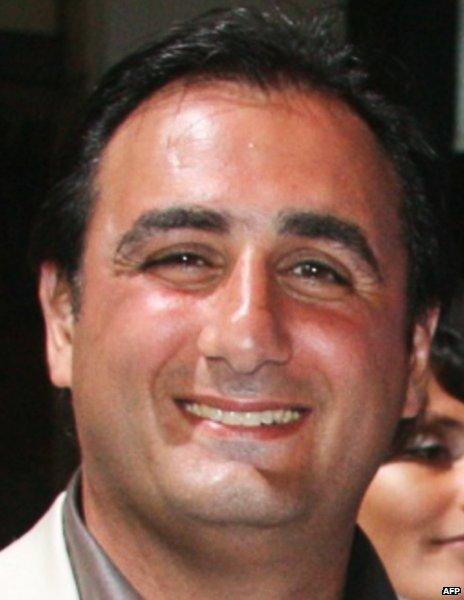
A 45-year-old salesman for an IT company, his children went to a Jewish school in Montrouge, not far from where a policewoman was murdered by Coulibaly.
He had also gone to the supermarket before the start of Sabbath, to buy some things for his wife who was picking up the children from school.
He had already lost a son, who was buried in Israel.

Francois-Michel Saada
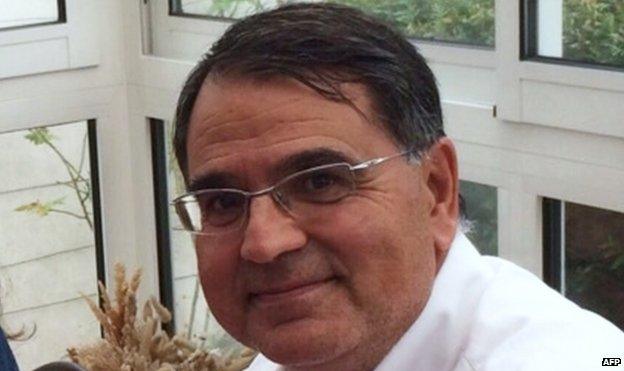
Aged 63, he was a retired pension fund manager with a wife of more than 30 years and two children, both living in Israel.
Born in Tunis, Mr Saada was described as devoted to his family.
He was killed after he had tried to enter the supermarket moments after Coulibaly had begun his siege, reports said.
